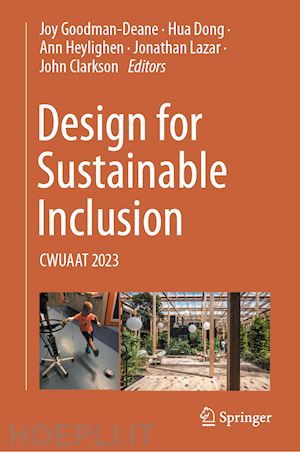

Questo prodotto usufruisce delle SPEDIZIONI GRATIS
selezionando l'opzione Corriere Veloce in fase di ordine.
Pagabile anche con Carta della cultura giovani e del merito, 18App Bonus Cultura e Carta del Docente
This book, Design for Sustainable Inclusion, was inspired and informed by the United Nations Sustainable Development Goals. These include, among others, ‘good health and well-being’, ‘reduced inequalities’ and ‘sustainable cities and communities’. Addressing this challenge requires a cross-disciplinary approach and close collaboration with many stakeholders. The Cambridge Workshop on Universal Access and Assistive Technology (CWUAAT) 2023 invited participants from a wide variety of disciplines to contribute to the discussion on this topic.
This book represents the papers presented at this conference, chosen by peer review by an international panel of currently active researchers. The chapters within the book provide a unique insight into current national and international research in the fields of inclusive design, universal access, and assistive and rehabilitative technology. The main sections of the book reflect the following key themes:
• Understanding people
• Designing for an ageing population
• Inclusive built environments
• Healthcare
• Assistive technology
• Design methods• Education and training
We hope that this book will be useful to researchers, teachers, students and the general public who are interested in inclusive design and sustainable development.
Joy Goodman-Deane is a Senior Research Associate in the Inclusive Design group at the EDC. She gained a Ph.D. in Computing Science from Glasgow University in 2002 and worked as Research Associate there investigating the design of computer-based technology for older people. For the last 18 years, she has worked at the Engineering Design Centre (EDC) at the University of Cambridge where her research has focused on inclusive design. Her interests focus on developing tools and methods to help support designers in putting inclusive design into practice. Joy helped to develop and author the Inclusive Design Toolkit as well as tools such as the Exclusion Calculator, Cambridge impairment simulators, and digital personas.











Il sito utilizza cookie ed altri strumenti di tracciamento che raccolgono informazioni dal dispositivo dell’utente. Oltre ai cookie tecnici ed analitici aggregati, strettamente necessari per il funzionamento di questo sito web, previo consenso dell’utente possono essere installati cookie di profilazione e marketing e cookie dei social media. Cliccando su “Accetto tutti i cookie” saranno attivate tutte le categorie di cookie. Per accettare solo deterninate categorie di cookie, cliccare invece su “Impostazioni cookie”. Chiudendo il banner o continuando a navigare saranno installati solo cookie tecnici. Per maggiori dettagli, consultare la Cookie Policy.